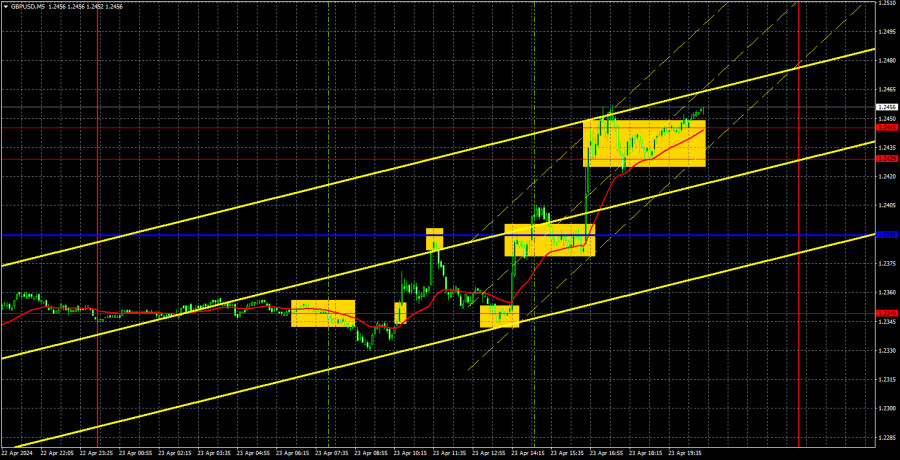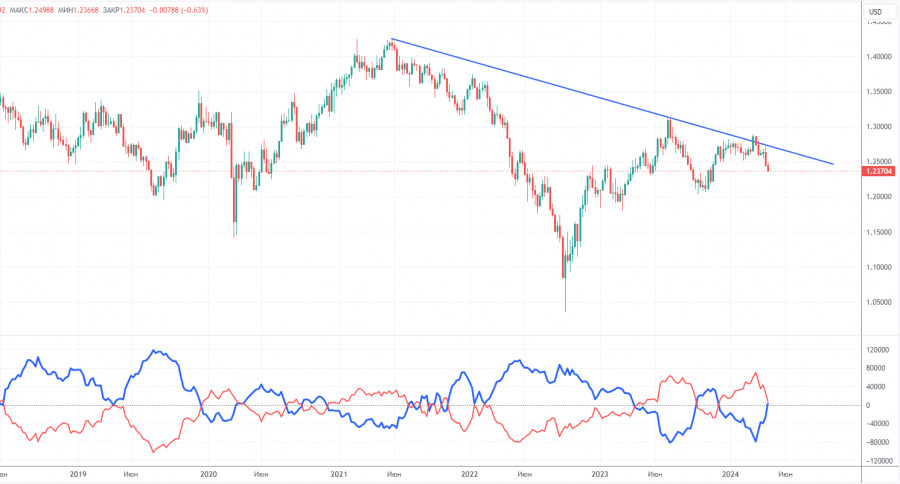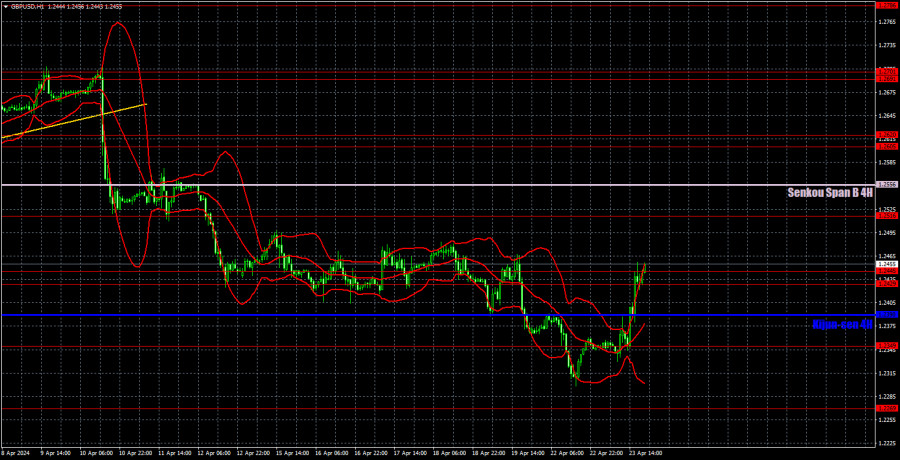Analysis of GBP/USD 5M

GBP/USD showed quite a strong rise on Tuesday. The macroeconomic background supported the pound. Although, we can’t say that it completely supported the British currency, but still, three out of four reports were in its favor. The UK Services PMI grew stronger than expected, while both US PMIs performed poorly. Therefore, it was absolutely logical for the pair to rise on Tuesday.
As a result, the GBP/USD pair started a new phase of upward movement, which may be a simple correction against the new downtrend that started after the price left the sideways channel of 1.25-1.28. We don’t believe that the pair will rise for long, as the PMI data could not significantly change the market sentiment from bearish to bullish. However, corrections are still valid. The price settled above the critical line, so it may rise up to the Senkou Span B line. Overall, yesterday’s macro data can be considered an exception to the rule, as usually US reports are stronger than British ones.
There were quite a few trading signals yesterday. The first sell signal around the level of 1.2349 turned out to be a false signal, and the price changed direction many times during the day. The second signal was a buy signal around the same level of 1.2349, and the price rose to the critical line. Traders could open short positions using bounces from the Kijun-sen line, and the movement ended around 1.2349. A bounce from this level led to new longs, which traders should have kept until the pair reached the area of 1.2429-1.2445. Three out of four trades were profitable. The total profit was about 100 pips.
COT report:

COT reports on the British pound show that the sentiment of commercial traders has frequently changed. The red and blue lines, which represent the net positions of commercial and non-commercial traders, constantly intersect and, in most cases, remain close to the zero mark. According to the latest report on the British pound, the non-commercial group closed 8,200 buy contracts and opened 11,400 short ones. As a result, the net position of non-commercial traders decreased by 19,600 contracts in a week. The fundamental background still does not provide a basis for long-term purchases of the pound sterling, and the currency finally has a real chance to resume the global downward trend. The trend line on the 24-hour TF clearly shows this.
The non-commercial group currently has a total of 71,800 buy contracts and 63,200 sell contracts. The bulls no longer have a significant advantage. Therefore, the pound has a huge potential to fall. We can only hope that inflation in the UK does not accelerate, or that the Bank of England will not intervene.
Analysis of GBP/USD 1H

On the 1H chart, GBP/USD has left the sideways channel of 1.25-1.28. Now, the pound should continue forming a downtrend, and the pair has the potential to fall by at least 400-500 pips. The fundamental and macroeconomic background continues to support the dollar, as the US economy is much stronger than the UK, and the Fed keeps pushing back its first rate cut. However, a correction has started, which may continue for some time.
As of April 24, we highlight the following important levels: 1.2215, 1.2269, 1.2349, 1.2429-1.2445, 1.2516, 1.2605-1.2620, 1.2691-1.2701, 1.2786, 1.2863, 1.2981-1.2987. The Senkou Span B line (1.2556) and the Kijun-sen line (1.2390) lines can also serve as sources of signals. Don’t forget to set a Stop Loss to breakeven if the price has moved in the intended direction by 20 pips. The Ichimoku indicator lines may move during the day, so this should be taken into account when determining trading signals.
On Wednesday, no significant events are scheduled in the UK, while the US will release an important report on durable goods orders. This report poses a threat to the dollar. After yesterday’s performance, the British pound may continue to rise if the US data turns out worse than forecasted. However, overall, we do not believe that several not-so-significant reports will turn the market upside down. The pound should continue to depreciate against the dollar.
Description of the chart:
Support and resistance levels are thick red lines near which the trend may end. They do not provide trading signals;
The Kijun-sen and Senkou Span B lines are the lines of the Ichimoku indicator, plotted to the 1H timeframe from the 4H one. They provide trading signals;
Extreme levels are thin red lines from which the price bounced earlier. They provide trading signals;
Yellow lines are trend lines, trend channels, and any other technical patterns;
Indicator 1 on the COT charts is the net position size for each category of traders;
The material has been provided by InstaForex Company – www.instaforex.com
